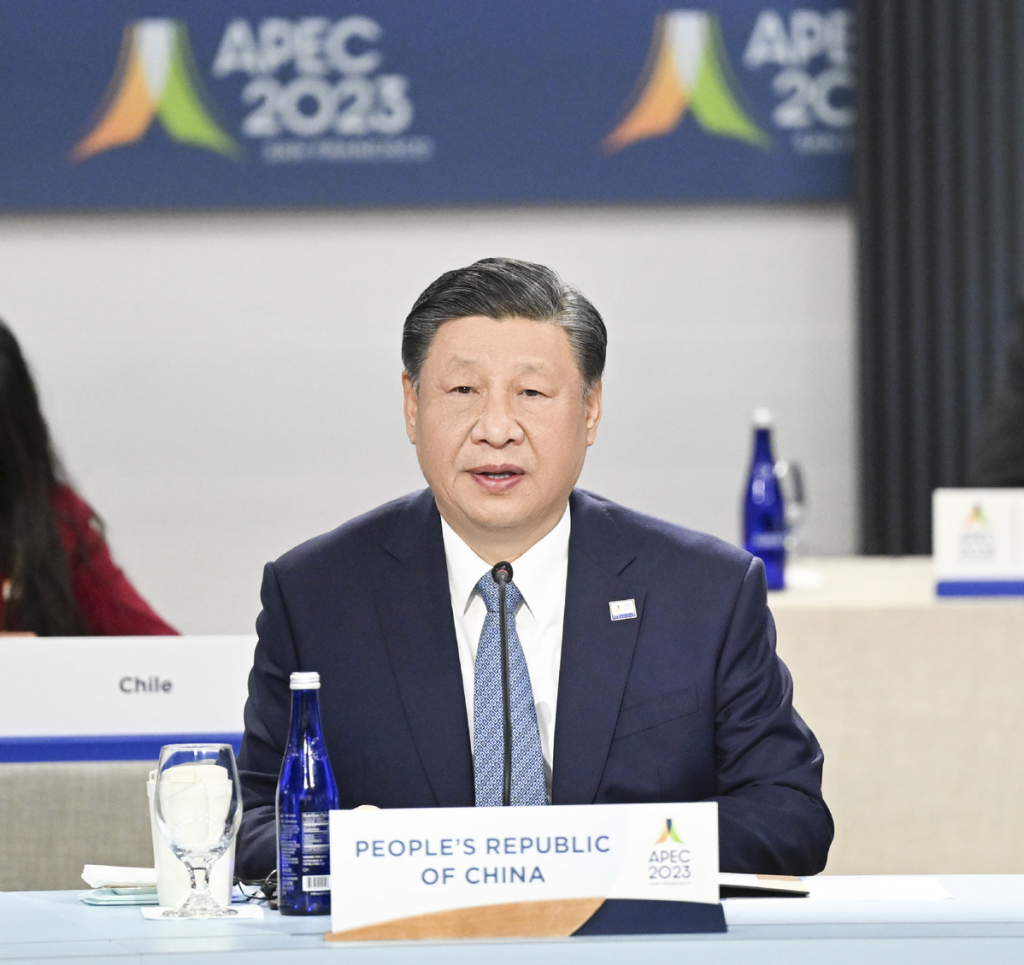By CAO DESHENG

President Xi Jinping addresses the 30th APEC Economic Leaders’ Meeting held at Moscone Center in San Francisco, the United States, Nov 17, 2023. [Photo/Xinhua]
Stresses need for exchanges and cooperation in science, technology
President Xi Jinping reiterated his opposition to any attempt to politicize, weaponize or impose security implications on economic and trade issues while addressing the 30th Asia-Pacific Economic Cooperation (APEC) Economic Leaders’ Meeting in San Francisco on Friday.
Xi also emphasized the need to promote exchanges and cooperation in the sector of science and technology, and work together for an open, fair, equitable and non-discriminatory environment for scientific and technological progress.
The meeting was chaired by US President Joe Biden and was attended by leaders and representatives of 21 economies in the Asia-Pacific region. A leaders’ declaration was adopted at the meeting.
Xi said that since the establishment of mechanisms of the APEC Economic Leaders’ Meeting, the regional forum has always stood at the global forefront of openness and development.
As the world economy faces multiple risks and challenges, Xi said the APEC economies should work together to meet global challenges and fully deliver on the Putrajaya Vision of building an open, dynamic, resilient and peaceful Asia-Pacific community.
He called on the APEC members to stick to innovation and openness to boost regional development.
“We must promote free and open trade and investment, support and strengthen the WTO-centered multilateral trading regime, and keep global industrial and supply chains open and stable,” he said.
Xi underscored the importance of promoting regional economic integration, and called for accelerating the building of a Free Trade Area of the Asia-Pacific and fully implementing the APEC Connectivity Blueprint to share in the opportunities of open regional development.
“China applies the highest standards in implementing the agreement of Regional Comprehensive Economic Partnership (RCEP), and has taken proactive steps to align its economic and trade rules with the high standards of the Comprehensive and Progressive Agreement for Trans-Pacific Partnership (CPTPP) and the Digital Economic Partnership Agreement (DEPA) to accelerate the process of its accession to the CPTPP and DEPA.”
The president also urged efforts to promote green and inclusive development that delivers benefits to all.
To accelerate the transition to green and low-carbon development, Xi said that the APEC members must deliver on the Bangkok Goals on Bio-Circular-Green (BCG) Economy, making “green” a defining feature of Asia-Pacific growth. “China is making active yet prudent moves toward its goal of carbon peak and carbon neutrality, and is accelerating its transition to green development,” he said.
While calling for putting development back on the center of international agenda, Xi said that China welcomes participation by all parties in the Global Development Initiative to deepen cooperation in poverty reduction, food security, industrialization and development financing, and to build a global community of development.
Xi reaffirmed that China remains committed to peaceful development and the ultimate goal of its development is to better people’s lives, “not to unseat anyone”. The Chinese modernization will bring the world more and greater opportunities for the modernization of all countries, he added.
Xi flew back to Beijing after the meeting.
Briefing media about the president’s trip to San Francisco, Wang Yi, member of the Political Bureau of the Communist Party of China Central Committee and foreign minister, highlighted the fruitful achievements from the Xi-Biden summit.
He said that the two leaders’ interactions matter to whether China-US ties can develop steadily, and also serve as the strategic guidance to the China-US relations.
Through this summit meeting in San Francisco, China-US relations are expected to continue developing in a stable, healthy and sustainable direction, Wang said.
However, it should be noted that China-US relations are complex and complicated, and there are still erroneous aspects in the US’ perception of China, which still need to be corrected, he added.
chinadaily.com.cn
 Africa -China Review Africa -China Cooperation and Transformation
Africa -China Review Africa -China Cooperation and Transformation
